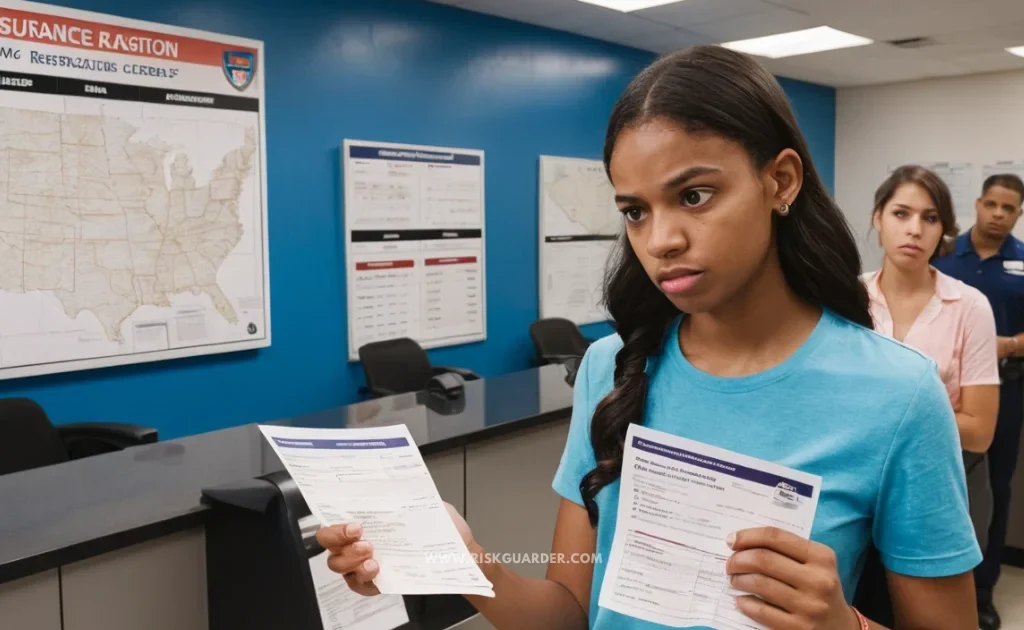Yes, in almost all US states, you are required to show proof of active car insurance to register your vehicle or renew your registration. However, requirements, minimum coverage levels, and acceptable forms of proof vary significantly by state, and there’s one notable exception.
Key Takeaways:
- Insurance is required for car registration in 49 out of 50 states
- Coverage requirements vary significantly between states
- You’ll need to provide valid proof of insurance during registration
- Failing to maintain insurance can result in fines, license suspension, or vehicle impoundment
Why is Insurance Usually Required for Registration? (Do I Need Insurance to Register a Car)

State governments require insurance during vehicle registration for several compelling reasons. First and foremost is financial responsibility. If you cause an accident, insurance ensures you can pay for damages to others’ property and medical expenses. This protects accident victims from bearing the financial burden of someone else’s mistake.
The requirement also serves as an enforcement mechanism. By linking insurance to registration, states create a practical way to ensure drivers maintain continuous coverage. Without this connection, many drivers might register their vehicles but never purchase insurance, creating significant risk on public roads.
Additionally, mandatory insurance requirements help keep insurance costs lower for everyone. When more drivers are insured, the risk pool expands, potentially reducing premiums across the board. This creates a more stable and affordable insurance marketplace for all drivers.
State-by-State Car Insurance Requirements for Registration
Insurance requirements vary significantly across the United States. The table below provides a comprehensive overview of each state’s requirements, minimum liability coverage, and links to official resources.
| State | Insurance Required | Minimum Liability Coverage | Official DMV Resource |
|---|---|---|---|
| Alabama | Yes | 25/50/25 | Alabama DMV |
| Alaska | Yes | 50/100/25 | Alaska DMV |
| Arizona | Yes | 25/50/15 | Arizona DMV |
| Arkansas | Yes | 25/50/25 | Arkansas DMV |
| California | Yes | 15/30/5 | California DMV |
| Colorado | Yes | 25/50/15 | Colorado DMV |
| Connecticut | Yes | 25/50/25 | Connecticut DMV |
| Delaware | Yes | 25/50/10 | Delaware DMV |
| Florida | Yes | 10/20/10 (PIP) | Florida DMV |
| Georgia | Yes | 25/50/25 | Georgia DMV |
| Hawaii | Yes | 20/40/10 | Hawaii DMV |
| Idaho | Yes | 25/50/15 | Idaho DMV |
| Illinois | Yes | 25/50/20 | Illinois DMV |
| Indiana | Yes | 25/50/25 | Indiana DMV |
| Iowa | Yes | 20/40/15 | Iowa DMV |
| Kansas | Yes | 25/50/25 | Kansas DMV |
| Kentucky | Yes | 25/50/25 | Kentucky DMV |
| Louisiana | Yes | 15/30/25 | Louisiana DMV |
| Maine | Yes | 50/100/25 | Maine DMV |
| Maryland | Yes | 30/60/15 | Maryland DMV |
| Massachusetts | Yes | 20/40/5 | Massachusetts DMV |
| Michigan | Yes | 50/100/10 | Michigan DMV |
| Minnesota | Yes | 30/60/10 | Minnesota DMV |
| Mississippi | Yes | 25/50/25 | Mississippi DMV |
| Missouri | Yes | 25/50/25 | Missouri DMV |
| Montana | Yes | 25/50/20 | Montana DMV |
| Nebraska | Yes | 25/50/25 | Nebraska DMV |
| Nevada | Yes | 25/50/20 | Nevada DMV |
| New Hampshire | No | Not required | New Hampshire DMV |
| New Jersey | Yes | 15/30/5 | New Jersey DMV |
| New Mexico | Yes | 25/50/10 | New Mexico DMV |
| New York | Yes | 25/50/10 | New York DMV |
| North Carolina | Yes | 30/60/25 | North Carolina DMV |
| North Dakota | Yes | 25/50/25 | North Dakota DMV |
| Ohio | Yes | 25/50/25 | Ohio DMV |
| Oklahoma | Yes | 25/50/25 | Oklahoma DMV |
| Oregon | Yes | 25/50/20 | Oregon DMV |
| Pennsylvania | Yes | 15/30/5 | Pennsylvania DMV |
| Rhode Island | Yes | 25/50/25 | Rhode Island DMV |
| South Carolina | Yes | 25/50/25 | South Carolina DMV |
| South Dakota | Yes | 25/50/25 | South Dakota DMV |
| Tennessee | Yes | 25/50/15 | Tennessee DMV |
| Texas | Yes | 30/60/25 | Texas DMV |
| Utah | Yes | 25/65/15 | Utah DMV |
| Vermont | Yes | 25/50/10 | Vermont DMV |
| Virginia | Yes* | 30/60/20 | Virginia DMV |
| Washington | Yes | 25/50/10 | Washington DMV |
| West Virginia | Yes | 25/50/25 | West Virginia DMV |
| Wisconsin | Yes | 25/50/10 | Wisconsin DMV |
| Wyoming | Yes | 25/50/20 | Wyoming DMV |
*Virginia allows drivers to pay an uninsured motorist fee of $500 instead of purchasing insurance.
The coverage numbers represent the minimum liability limits in thousands of dollars (bodily injury per person/bodily injury per accident/property damage). For example, 25/50/25 means $25,000 for bodily injury per person, $50,000 for bodily injury per accident, and $25,000 for property damage.
The Exception: Registering a Car Without Insurance

New Hampshire stands as the only state that doesn’t require car insurance to register a vehicle. This aligns with the state’s “Live Free or Die” motto, allowing residents to choose whether to purchase auto insurance. However, New Hampshire drivers are still financially responsible for damages they cause in accidents, which could lead to substantial out-of-pocket costs without insurance.
Virginia offers a unique alternative, allowing drivers to pay an uninsured motorist fee of $500 annually instead of purchasing insurance. This fee doesn’t provide any coverage – it simply permits legal operation of an uninsured vehicle. Drivers who choose this option remain personally liable for any damages they cause, potentially facing significant financial risk.
It’s worth noting that while these exceptions exist, having insurance remains the financially prudent choice in both states. Even where not legally required, going without insurance exposes drivers to considerable financial risk that could lead to bankruptcy or asset seizure after a serious accident.
What Counts as Valid Proof of Insurance?
When registering your vehicle, you’ll need to provide acceptable proof of insurance. The most common forms include:
- Insurance ID Card: The standard proof provided by your insurance company, containing policy information, coverage dates, and vehicle details. Most states now accept digital versions of these cards on smartphones.
- Insurance Binder: A temporary document issued by your insurance company while your permanent policy is being processed. This is especially useful when purchasing a new vehicle.
- Insurance Declaration Page: The summary page of your policy that outlines coverage types, limits, deductibles, and premium amounts. This is typically more detailed than an ID card.
- SR-22/FR-44 Certificate: A special form filed by your insurance company to the state verifying you have the minimum required coverage. This is typically required for high-risk drivers with previous violations.
- Electronic Verification: Many states have implemented electronic verification systems that allow DMV employees to instantly verify your insurance status in their database, reducing paperwork.
Always check with your specific state DMV to confirm which forms of proof they accept, as requirements can change. Some states have stricter documentation requirements than others, particularly for new registrations versus renewals.
What Happens If I Don’t Have Insurance During Registration?
Attempting to register a vehicle without required insurance carries serious consequences that extend beyond simply being denied registration. The specific penalties vary by state but commonly include:
Immediate Consequences:
- Registration application will be denied
- Unable to legally operate the vehicle
- May be unable to complete a vehicle purchase
If Caught Driving Without Insurance:
- Substantial fines (typically $500-$1,500 for first offense)
- License suspension (commonly 30 days to 1 year)
- Vehicle impoundment at owner’s expense
- Requirement to file SR-22 for several years
- Increased insurance rates when you do obtain coverage
If Insurance Lapses After Registration:
- Many states have electronic verification systems that detect lapses
- Registration suspension without notice in some states
- Reinstatement fees to restore registration
- Potential requirement to surrender license plates
In states like California and New York, the penalties are particularly severe. California can impose fines up to $1,000 plus penalty assessments for driving without insurance, while New York may fine uninsured drivers up to $1,500 and impose a three-year revocation of both license and registration for repeat offenders.
The financial impact extends beyond immediate penalties. After an insurance lapse, you’ll likely be classified as a higher-risk driver, resulting in significantly higher premiums when you do obtain coverage. Some insurers may even decline to offer you standard coverage.
Special Circumstances
Registering a Car That Won’t Be Driven
If you own a vehicle that won’t be operated on public roads, you may have options to register it without insurance in some states. This typically applies to:
- Collector cars being restored
- Vehicles in long-term storage
- Seasonal vehicles (like convertibles stored during winter)
Many states offer a Planned Non-Operation (PNO) status or similar designation. California’s PNO status, for example, allows you to maintain ownership registration without insurance, provided the vehicle isn’t operated on public roads. This status must be renewed annually.
To register a non-operational vehicle:
- Visit your local DMV
- Request non-operational or storage status
- Pay a reduced registration fee (typically much lower than standard registration)
- Surrender your license plates in some states
Remember that if you later decide to drive the vehicle, you must obtain insurance and convert to standard registration before operating it on public roads.
Temporary Registration/Tags
Temporary registration presents unique insurance considerations. When purchasing a new or used vehicle from a dealership, you’ll typically receive temporary tags valid for 30-90 days, depending on your state. Even with temporary tags, you must have insurance that meets your state’s minimum requirements.
Most insurance companies offer a grace period (typically 7-30 days) to add a newly purchased vehicle to an existing policy. However, this only applies if you already have insurance on another vehicle. If you’re a first-time car buyer, you must secure insurance before driving off the dealership lot.
For private party purchases, the requirements are similar – you need insurance before obtaining temporary registration. Some states offer very short-term temporary permits (24-72 hours) specifically for transporting an unregistered vehicle to your home or to an inspection station.
Registering an Out-of-State Vehicle
When moving to a new state or purchasing a vehicle from another state, you’ll need to navigate both registration and insurance requirements. Most states require new residents to register their vehicles within 30-90 days of establishing residency.
The process typically involves:
- Obtaining insurance that meets your new state’s requirements
- Getting a VIN inspection (required in many states for out-of-state vehicles)
- Paying applicable sales tax or proving tax was paid in another state
- Passing emissions testing if required in your new state
- Surrendering your out-of-state title and registration
Insurance considerations are particularly important when moving between states. You should:
- Contact your insurance company before moving to discuss policy changes
- Ensure your coverage meets the new state’s minimum requirements
- Update your policy with your new address before registration
- Obtain proof of insurance that satisfies the new state’s DMV requirements
Leased or Financed Vehicles
When leasing or financing a vehicle, you’re subject to additional insurance requirements beyond state minimums. Lenders and leasing companies protect their investment by requiring:
- Comprehensive and collision coverage: These coverages protect the vehicle itself against damage, regardless of fault.
- Higher liability limits: Many lenders require liability coverage well above state minimums, typically 100/300/50 or higher.
- GAP insurance: Particularly important for leased vehicles, this covers the difference between what you owe and the vehicle’s depreciated value if it’s totaled.
- Lower deductibles: Maximum deductibles are often capped at $500 or $1,000.
Your lender or leasing company must be listed on your insurance policy as a lienholder or additional insured party. This ensures they’re notified of any policy changes or lapses. When registering a leased or financed vehicle, you’ll need to provide:
- Proof of insurance meeting both state and lender requirements
- Documentation from the leasing company or lender
- The vehicle’s title or title application with lienholder information
If your insurance lapses on a financed vehicle, the lender may purchase “force-placed insurance” on your behalf – typically at much higher rates – and add the cost to your loan payments.
How to Get Insurance Before You Register
Securing proper insurance before registration requires careful planning. Follow these steps to ensure a smooth process:

- Research minimum requirements: Verify your state’s specific coverage requirements using the table provided earlier in this article.
- Gather necessary information: Before requesting quotes, have your driver’s license, vehicle identification number (VIN), current odometer reading, and personal information ready.
- Compare multiple quotes: Insurance rates can vary dramatically between providers for the same coverage. Obtain quotes from at least 3-5 different companies.
- Consider coverage beyond minimums: State minimums often provide inadequate protection in serious accidents. Consider higher liability limits and optional coverages like comprehensive, collision, and uninsured motorist protection.
- Ask about discounts: Many insurers offer discounts for bundling policies, good driving records, safety features, or completing defensive driving courses.
- Verify the company’s reputation: Check customer reviews and financial stability ratings from organizations like A.M. Best or J.D. Power.
- Purchase the policy: Once you’ve selected an insurer, purchase your policy with an effective date before your planned registration date.
- Obtain proof of insurance: Request electronic and physical proof of insurance immediately. Most insurers can provide these documents instantly.
Remember that state minimum coverage levels are just that – minimums. They often provide insufficient protection in serious accidents. For example, California’s property damage minimum of just $5,000 would barely cover repairs to a modern vehicle in even a minor collision. Consider purchasing higher limits for better protection.
Frequently Asked Questions About Insurance and Car Registration
Can I register my car with temporary insurance?
Yes, you can register your car with temporary insurance in most states, provided the policy meets the state’s minimum coverage requirements. However, be aware that most states have systems that verify ongoing insurance coverage. If your temporary policy expires and you don’t replace it, you may face registration suspension and penalties.
What if my insurance lapses after registration?
If your insurance lapses after registration, you risk serious consequences. Many states have electronic verification systems that automatically detect insurance lapses and can suspend your registration without notice. To reinstate your registration, you’ll typically need to provide proof of new insurance and pay reinstatement fees. Some states may also require you to surrender your license plates during the lapse period.
Can I register a car in one state but insure it in another?
Generally, no. Your vehicle should be insured in the same state where it’s registered, as insurance regulations and requirements vary by state. Insurance companies expect your vehicle to be principally garaged where it’s registered. Misrepresenting this information could lead to claim denials or policy cancellation.
Do I need insurance to register a non-operational vehicle?
It depends on your state. Many states offer a Planned Non-Operation (PNO) status or similar designation that allows registration without insurance for vehicles that won’t be operated on public roads. However, standard registration almost always requires insurance, even if the vehicle won’t be driven immediately.
Can I register a car without insurance if I don’t have a driver’s license?
In states requiring insurance for registration, you’ll need insurance regardless of whether you have a license. However, obtaining insurance without a license can be challenging. Some companies may issue a policy if you’re listed as the owner but not a driver, with licensed drivers listed on the policy. Specialized non-owner policies are also available in some cases.
What happens if I provide fake insurance information during registration?
Providing fraudulent insurance information is a serious offense that can result in:
- Misdemeanor or felony charges depending on the state
- Substantial fines (often $1,000+)
- Vehicle registration revocation
- Possible license suspension
- Difficulty obtaining insurance in the future
Modern electronic verification systems make detection of fake insurance increasingly likely.
Conclusion
In nearly all states, insurance is a mandatory requirement for vehicle registration. This requirement serves to protect both you and others on the road from potentially devastating financial consequences following an accident. While New Hampshire stands as the lone exception to mandatory insurance, and Virginia offers an uninsured motorist fee alternative, maintaining proper coverage remains the financially responsible choice regardless of where you live.
The specific insurance requirements vary significantly by state, with minimum liability limits ranging from as low as 10/20/5 to as high as 50/100/25. Always verify your state’s current requirements before registration, as these minimums can change through legislation.
Remember that state minimums are just that – minimums. They often provide inadequate protection in serious accidents. Consider purchasing higher liability limits and additional coverages like comprehensive, collision, and uninsured motorist protection for more complete financial security.
Failing to maintain proper insurance can result in severe consequences, including registration suspension, fines, and even vehicle impoundment. The financial impact of these penalties far outweighs the cost of maintaining continuous coverage.
By understanding your state’s specific requirements and obtaining appropriate coverage before registration, you can ensure a smooth registration process and drive with confidence knowing you’re both legally compliant and financially protected.






